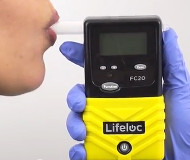8/27/2015
Idaho Supreme Court Declares Threat Of Fines And License Suspension Is Not CoercionIdaho Supreme Court rules that it is not coercion to threaten motorists into using a handheld preliminary breath tester.

Telling a driver that she would lose her right to drive for a year and have to pay $250 unless she submitted to a portable breath test is not coercion. That was the conclusion the Idaho Supreme Court reached last week as it considered the case of Felicity Kathleen Haynes, who was pulled over on February 23, 2013 on suspicion that she was driving under the influence of alcohol (DUI).
Only after being told of the penalties she faced for refusal did Haynes consent to blow into the Lifeloc FC20 portable breath tester. This was not the full-size breathalyzer, but the tiny device nonetheless produced evidence leading to her conviction. She later argued that the consent she gave to blowing into the handheld device was worthless because it was given under coercion. In considering this, the high court reasoned that it did not need her consent to conduct the breath test since the breath test is already consistent with the Fourth Amendment and the equivalent provision of Idaho's state constitution.
"Both provisions only protect against unreasonable searches; they do not prohibit reasonable searches," Justice Daniel T. Eismann wrote for the majority. "Thus, the issue is whether a request by a peace officer that a person submit to a breath test constitutes an unreasonable search where the officer had reasonable grounds to believe that the person was operating or in actual control of a motor vehicle while under the influence of alcohol. We hold that it does not."
The justices fell back on the "implied consent" doctrine, a consent that she could have withdrawn at any time. Since she did not do so, she had no expectation of privacy. The court also insisted that the breath test is acceptable because it represents a minor inconvenience.
"The breath test only requires that the person blow air into a machine or other device for the purpose of measuring the alcohol concentration in the person's exhaled breath," Justice Eismann wrote. "The breath test is not invasive, and there is no contention that it could put the person at risk of injury. The person is not required to undress or expose any portion of his or her body that is normally covered."
For these reasons, the justices concluded that the breath test was a reasonable search, for which no warrant was required. Justice W. Jones warned of the danger of this line of reasoning.
"The majority holds herein that the administration of the breath test did not violate Ms. Haynes' rights because the Idaho Constitution only protects against unreasonable searches and breath tests are reasonable," Justice Jones wrote in a concurring opinion. "I feel that such a ruling improperly abrogates the warrant requirement in lieu of a general reasonableness standard."
Justice Jones agreed with the outcome of the majority decision under the theory that voluntary consent is still voluntary, even if it is given to avoid penalties.
A copy of the case is available in a 100k PDF file at the source link below.


